Get to know How to Increase Your Credit Limit (Without Harming Your Score)?
Triston Martin
Feb 14, 2024
Raising your credit limit may not hurt your score. A better credit score is certainly a possibility. One of the many elements that can affect your score is how you handle the increased credit line. The percentage of your available credit to the total amount you've borrowed can be a factor in your credit score.
The ratio of your entire credit card debt to your total credit card limit is known as your credit utilization ratio. A credit usage ratio of 30% or less is ideal, but the lower it is, the better it is for your score. Overall credit use and individual card utilization are also considered in credit scores. Both of these numbers should be kept low.
Are you wondering how to get credit limit increase without hurting your credit score? If your credit limit is raised, you may be able to reduce your use rate. Your credit score should improve if you have the same spending patterns and always pay your bills on time. Nevertheless, your credit rating could take a hit if you use the newfound spending money to buy things you don't need.

What Is A Credit Limit?
The maximum amount a creditor or financial institution will allow a borrower to put toward their credit card balance is known as the credit limit. Borrowers are free to spend up to their approved credit limit, but doing so may incur costly overdraft fees and even harm their credit scores if they continue to do so.
Lenders determine the credit limit on unsecured credit cards based on the applicant's income, credit history, and other personal details. After that, the potential borrower gets extended the credit limit.
On the other hand, secured credit cards necessitate an upfront cash deposit from the applicant against which the lender extends credit. In such a scenario, the credit limit often equals the amount deposited in full.

How To Increase Your Credit Limit?
Your bank or credit card company may increase your credit limit if you request it. But you should hold off for a while if you're a new customer. It is for the lender's benefit, so they can see that you can be trusted to repay the loan regularly.
Your credit card company is not likely to increase your limit if you have previously exceeded it or if you have been late with payments. Your overdraft history will likely be reported to credit bureaus, which could influence your eligibility for future credit.
A greater credit limit may be automatically extended to you once you've been with a bank or card issuer for some time. The decision to accept this is optional. You can decline the suggested wage hike or ask for a smaller increase. You can decline future rate hikes by making your preference explicit when you apply for the card or at any time after that.
Should I Increase Credit Purchase Limit?
The best candidates for an increase credit limit are those with a stable income, a proven track record of responsible money management, and a history of making timely monthly payments in full. For instance, if you know you can easily cover your debt after a major purchase.
An increase in credit is recommended if you use your credit card for business spending so that you don't run out of money before you can get reimbursed. But, a credit rise could worsen if you struggle to make ends meet and repay your obligations. The last thing you need while trying to get out of debt is additional debt.
Contact your credit card company if this is the case. The FCA requires them to consider your circumstances and provide suitable assistance, such as a fair repayment plan to help you pay off your credit card debt sooner. If you're worried about going into debt due to excessive spending, you may want to consider requesting a reduced credit limit instead of an increase.
How To Increase Credit Limit Capital One Automatically
Capital One says they will examine your account for credit line increases as soon as every six months with some cards. Capital One warns that there are several reasons why it can say no to a request to raise a credit line, including past-due payments to other creditors. You might be able to receive a higher credit line without ever requesting it.
Consider waiting until you are offered an automatic increase in your credit limit if you are not in a hurry to receive one. If your credit card company sees that you always make your minimum payment on time and use your card properly, they may boost your credit limit automatically. Six to twelve months of regular bill payment is usually required.
If you are approved for a greater credit limit, it may improve your credit score because your credit utilization ratio will go down. Moreover, card issuers employ a soft inquiry to trigger this adjustment in credit limits when the card member does not request the change. Credit scores are not impacted by soft inquiries in the same way that they are by hard inquiries.
Conclusion:
There are several scenarios in which a higher credit card limit may be desirable. You may need a higher credit limit to cover an upcoming emergency or want to use this to raise your credit score. Remember that a request like this can result in a hard credit inquiry, negatively affecting your credit score as you deliberate whether or not to continue requesting a higher credit limit.
You should demonstrate appropriate payment habits if you want your credit limit increased. When a credit card company has faith in your ability to make payments on schedule, it may boost your credit limit. Making payments on schedule, increasing your credit score, and keeping your utilization ratio low are all good ways to boost your credit limit.







